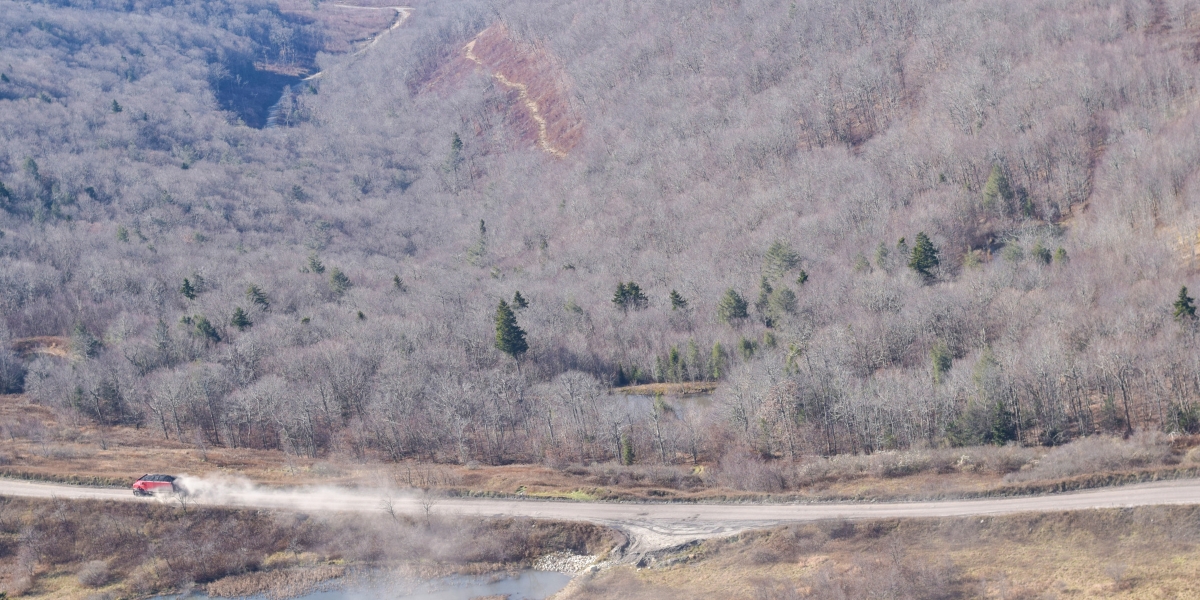By Olivia Miller
On January 10, the West Virginia Highlands Conservancy joined Appalachian Voices, the Center for Biological Diversity, Greenbrier River Watershed Association, Kanawha Forest Coalition, and the Sierra Club in bringing a lawsuit against the United States Forest Service for failing to protect streams designated as critical habitat for the endangered candy darter from coal hauling in the Monongahela National Forest.
In the rugged terrain of the Cherry River Watershed, the streams that sustain life for the remaining stronghold population of the candy darter are interspersed with thousands of acres of strip mining and timber operations.
In this watershed—Laurel Creek and both the South and Nork Fork of the Cherry River are designated as critical habitat for the candy darter. The designation is intended to protect particular areas of a species’ habitat that contain elements essential to supporting its life—meaning any harm to the streams will likely harm the fish.
Candy darters are native to the Upper Kanawha River Basin in West Virginia and Virginia. The enamoring bright orange and blue fish are found nowhere else in the world. The species was first documented in 1931 in Pocahontas County. Since then, half of the known candy darter populations have been eradicated due to sedimentation and other human-caused impacts.
The Cherry River watershed, in particular, harbors a high percentage of forest cover and the absence of variegate darters, which fosters a high degree of connectivity among populations. The stream corridors and mixed conifer and red spruce forests in this area also provide summer roosting and foraging habitat for two endangered bats: the northern long-eared bat and the Indiana bat.
South Fork Coal Company holds permits for ten mining operations in the Cherry River watershed. One of these mines, the 1,000-plus-acre Rocky Run Surface Mine, can only be accessed via a haul road that crosses through the Monongahela National Forest. In 2021, the Forest Service issued a commercial road use permit to allow the private coal company to haul coal mined at Rocky Run Mine along Forest Service roads.
The road use permit granted by the Forest Service in 2021 allows South Fork Coal Company to haul oversized coal loads and conduct extensive road clearing and construction—including tree cutting, regrading and widening the road, and removing and replacing culverts on FS 249, a gravel road on steep slopes above South Fork Cherry River and Laurel Creek. The permit also allows the company to haul mining supplies, equipment, personnel, and explosives on FS 223, a gravel road along a direct tributary to the North Fork Cherry River.
In March and April 2022, South Fork Coal Company was cited for violations leading to excess sedimentation during a time of year when candy darters are spawning in South Fork Cherry River. Inspections by the Forest Service found that the company was not properly maintaining the roadways and documented sedimentation escaping the roadway and crushed and blocked culverts in tributaries to South and North Fork Cherry Rivers.
The company was also cited in November 2023 for violations related to spreading raw coal on the roadway. Spreading coal ash on the road and coal dust spewing from coal trucks can result in toxic chemicals and heavy metals such as selenium and lead reaching the rivers and harming aquatic life.
In response to the demonstrated pattern of violations, on December 10, 2023 WVHC issued a ten day notice to the Office of Surface Mining Reclamation and Enforcement requesting that the problems be resolved. To date, no action has been taken by the Office to hold the coal company or federal agencies accountable for the increasing number of violations occurring in this sensitive ecosystem.
The suit brought by WVHC and our partners in January faults the Forest Service for failure to consult with the U.S. Fish and Wildlife Service to ensure the candy darter would not be jeopardized and its critical habitat not destroyed or adversely modified—as mandated by the Endangered Species Act—before issuance of the road use permit.
The agency did not conduct an environmental analysis as required by the National Environmental Policy Act, which requires environmental review for any federal action that may have significant environmental effects.
As notices of violations against South Fork Coal Company continue to pile up and the candy darter is unjustly pushed to its limits, conservation groups are asking the court to vacate and set aside the permit issued by the Forest Service and direct the agency to complete consultation with the Fish and Wildlife Service and environmental reviews as required by law.
For more information, visit the Allegheny-Blue Ridge Alliance project website.

